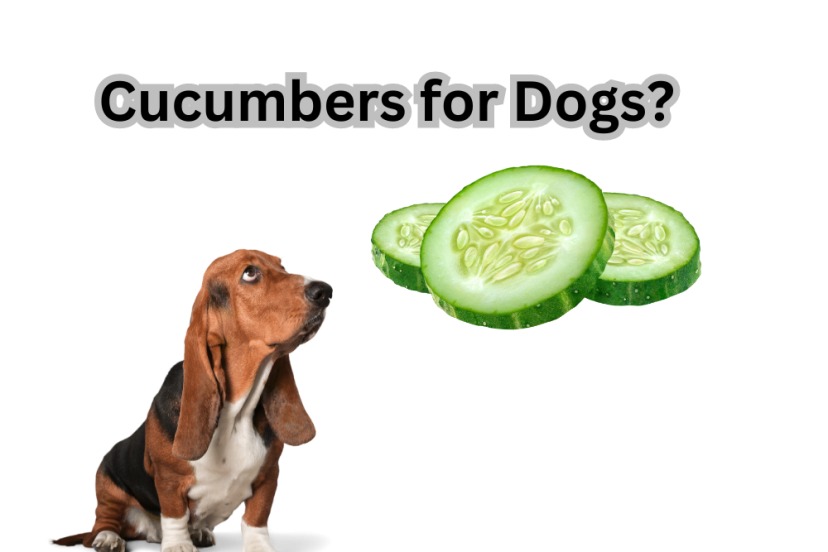Can Dogs Have Cucumbers? Examining This Tasty Treat for Dogs
As a passionate dog lover and advisor, I understand the significance of providing a healthy and balanced diet for our furry companions. Many dog owners often wonder about sharing their favorite foods, and find themselves asking “Can dogs have cucumbers?”
In this article, I will delve into the topic of whether dogs can safely have cucumbers and provide helpful suggestions and reasons for incorporating them into their diet.
Understanding Cucumbers
Cucumbers are not only a refreshing and crunchy vegetable for humans, but they also offer various nutritional benefits. Before we explore their suitability for dogs, let’s understand the nutritional composition of cucumbers.
Nutritional Composition of Cucumbers
Cucumbers are composed mainly of water, making them a hydrating snack for both humans and dogs. They are low in calories, fat-free, and contain a good amount of vitamins and minerals. Cucumbers are a rich source of vitamin K, which plays a role in blood clotting and bone health. They also provide vitamins C and B, as well as minerals like potassium, magnesium, and manganese.
Can Dogs Safely Eat Cucumbers?
When it comes to feeding cucumbers to dogs, the answer is generally yes, but with important considerations. Dogs can safely consume cucumbers, but it’s crucial to keep certain factors in mind.
General Safety Considerations
Cucumbers themselves are not toxic to dogs, but it’s essential to ensure that they are prepared and served in a safe manner. Avoid using cucumbers that have been treated with pesticides or other harmful chemicals.
If possible, choose organic cucumbers to minimize the risk of exposure to pesticides. Additionally, remove the peel and seeds before offering cucumbers to your dog, as these parts can be challenging to digest and may cause stomach upset.
Potential Risks and Concerns
While cucumbers are generally safe for dogs, there are a few potential risks and concerns to be aware of. Dogs with certain health conditions, such as kidney or bladder issues, may need to avoid cucumbers due to their diuretic properties.
Excessive consumption of cucumbers may also lead to digestive upset, such as diarrhea or gas, especially if introduced abruptly into the diet. It’s crucial to observe your dog’s individual response and adjust accordingly.
Health Benefits of Cucumbers for Dogs
Cucumbers offer several potential health benefits for dogs when incorporated into their diet in moderation. Let’s explore some of these benefits:
1) Hydration Support:
Cucumbers are made up of approximately 95% water, making them an excellent hydrating option for dogs. Proper hydration is essential for maintaining optimal body temperature, supporting organ function, and aiding in digestion. Offering slices of fresh cucumber can help keep your dog hydrated, especially during hot weather or physical activity.
2) Digestive Health:
The high water content and fiber in cucumbers can contribute to a healthy digestive system in dogs. Fiber adds bulk to the stool, promoting regular bowel movements and helping to prevent constipation. It can also aid in the management of certain gastrointestinal disorders, such as diarrhea or irregularity. Including cucumbers as part of a balanced diet can help support your dog’s digestive health.
3) Nutritional Value:
Cucumbers are low in calories and fat, making them a healthy addition to your dog’s diet. They contain several essential vitamins and minerals, including vitamin K, vitamin C, potassium, and magnesium. Vitamin K is important for proper blood clotting, while vitamin C acts as an antioxidant, supporting the immune system and promoting overall health. Potassium and magnesium are necessary for maintaining healthy muscle function and electrolyte balance in dogs.
4) Weight Management:
Cucumbers are an ideal snack for dogs who need to manage their weight or maintain a healthy body condition. They are low in calories and high in water content and fiber, which can help dogs feel full without adding excessive calories to their diet. By incorporating cucumbers as a low-calorie treat or part of their regular meals, you can aid in weight management and promote a healthy body weight for your dog.
5) Dental Health:
The crunchy texture of cucumbers can provide a natural form of dental exercise for dogs. Chewing on cucumber slices can help remove plaque and debris from their teeth, promoting better oral hygiene. However, it’s important to note that while cucumbers can contribute to dental health, they should not replace regular brushing or professional dental care for your dog.
6) Antioxidant Properties:
Cucumbers contain antioxidants, such as vitamin C and various phytochemicals, that help combat harmful free radicals in the body. These antioxidants play a crucial role in reducing oxidative stress and inflammation, supporting a healthy immune system, and reducing the risk of chronic diseases. By incorporating cucumbers into your dog’s diet, you can provide them with natural antioxidant support.
It’s important to note that while cucumbers offer health benefits, they should always be given in moderation and as part of a balanced diet. As with any food, individual dogs may have different sensitivities or tolerances. It’s important to observe your dog’s response to cucumbers and consult with a veterinarian if you have any concerns or if your dog has specific health conditions or dietary restrictions. By incorporating cucumbers responsibly, you can enhance your dog’s overall health and well-being.
Preparing Cucumbers for Dogs
When preparing cucumbers for your dog, it’s crucial to follow proper guidelines to ensure their safety and enjoyment. Consider the following tips:
Safe Methods of Preparation
Wash the cucumber thoroughly to remove any dirt or residue. If the cucumber is not organic, it’s advisable to peel off the skin to reduce the risk of pesticide exposure. Cut the cucumber into small, bite-sized pieces to make it easier for your dog to chew and digest. Remember to remove the seeds, as they can be challenging for dogs to digest and may cause gastrointestinal issues.
Serving Sizes and Feeding Guidelines
When introducing cucumbers to your dog’s diet, start with small portions to gauge their response. Offer a few slices or cubes of cucumber as a treat or mix them into their regular food. Monitor your dog for any signs of digestive upset or allergies. If your dog tolerates cucumbers well, you can gradually increase the serving size. However, always remember to maintain moderation and balance in their overall diet.
Introducing Cucumbers Gradually
If your dog is not accustomed to eating cucumbers or any new food, it’s recommended to introduce them gradually. Start with small portions and observe your dog’s response. Sudden dietary changes can sometimes lead to digestive upset, so it’s best to take it slowly and allow their system to adjust.
Risks and Precautions
While cucumbers are generally safe, it’s important to be mindful of a few risks and precautions:
1) Allergic Reactions and Sensitivities:
Some dogs may have allergies or sensitivities to cucumbers or certain components found in them. It’s essential to observe your dog closely when introducing cucumbers for the first time. Look for signs of itching, redness, swelling, digestive upset, or any other allergic reactions. If any adverse symptoms occur, discontinue feeding cucumbers and consult with a veterinarian.
2) Digestive Upset:
While cucumbers are generally well-tolerated by dogs, some may experience digestive upset if they consume large quantities or if their digestive system is sensitive. Too much cucumber, especially if introduced abruptly into the diet, can lead to diarrhea, gas, or an upset stomach. It’s important to introduce cucumbers gradually and monitor your dog’s response. It also helps to check around the belly area. Adjust the portion size or frequency of cucumber consumption as needed.
3) Pesticide Exposure:
If you’re using conventionally grown cucumbers, there is a risk of pesticide exposure. Pesticides can be harmful to dogs if ingested in large amounts. It’s advisable to choose organic cucumbers whenever possible or thoroughly wash conventionally grown cucumbers to minimize pesticide residue. Peeling the cucumber can also help reduce potential pesticide exposure.
4) Choking Hazard:
The shape and texture of cucumbers can pose a choking hazard, especially if they are not cut into appropriate sizes for your dog. Always ensure that cucumbers are sliced or cubed into bite-sized pieces before offering them to your dog. Avoid giving whole cucumber slices that may be too large or difficult to chew.
5) Individual Dietary Considerations:
Each dog is unique, and individual factors such as age, breed, size, and overall health should be taken into account when introducing new foods. If your dog has specific dietary restrictions or health conditions, it’s important to consult with a veterinarian before incorporating cucumbers into their diet. They can provide personalized guidance based on your dog’s specific needs.
6) Moderation and Balanced Diet:
While cucumbers offer certain health benefits, it’s important to remember that they should not replace a balanced and nutritionally complete diet for your dog. Cucumbers should be considered as a supplement or occasional treat rather than a primary food source. Ensure that your dog’s overall diet meets their nutritional requirements and consult with a veterinarian to determine the appropriate portion size and frequency of cucumber consumption.
By being aware of these risks and taking necessary precautions, you can ensure the safety and well-being of your dog when incorporating cucumbers into their diet. Always monitor your dog’s response, adjust as needed, and consult with a veterinarian if you have any concerns or questions. With responsible feeding practices, cucumbers can be a refreshing and healthy addition to your dog’s diet.
Alternatives to Cucumbers for Dogs
If you’re unsure about feeding cucumbers to your dog or if your dog has specific dietary restrictions, there are alternative vegetables that you can consider. Here are some safe and nutritious alternatives to cucumbers for dogs:
Carrots: Carrots are an excellent alternative to cucumbers. They are low in calories and high in vitamins, minerals, and fiber. Carrots can be served raw or cooked, but make sure to cut them into bite-sized pieces to prevent choking.
Green Beans: Green beans are another healthy option for dogs. They are low in calories and rich in fiber, vitamins, and minerals. Serve cooked or steamed green beans as a crunchy and nutritious snack for your dog.
Zucchini: Zucchini is a mild and hydrating vegetable that can be given to dogs. It is low in calories and high in vitamins A and C. You can serve it raw or cooked but remember to cut it into appropriate sizes for your dog to safely chew.
Celery: Celery is a crunchy and refreshing vegetable that dogs can enjoy. It is low in calories and a good source of vitamins A, C, and K. Chop celery into small pieces to prevent choking and offer it as a healthy treat.
Bell Peppers: Bell peppers are packed with vitamins and antioxidants. They come in different colors, such as red, green, and yellow, and provide a crunchy texture. Remove the seeds and slice the peppers into small pieces before giving them to your dog.
Remember, when introducing any new vegetable to your dog’s diet, start with small quantities and observe their response. Not all dogs have the same preferences or tolerances, so it’s important to tailor their diet to their individual needs and consult with a veterinarian if you have any concerns.
Consulting with a Veterinarian
Before making any significant changes to your dog’s diet or introducing new foods, it is always advisable to consult with a veterinarian. A veterinarian can provide personalized guidance based on your dog’s specific health needs, allergies, and dietary requirements. They can evaluate your dog’s overall health and advise you on the suitability of cucumbers or any other specific food for your furry friend.
Conclusion
As a dog enthusiast and advisor, I understand the importance of providing a healthy and balanced diet for our canine companions. When it comes to cucumbers, they can be a safe and nutritious addition to your dog’s diet when prepared and served correctly. Cucumbers offer hydration, fiber, vitamins, and minerals that can support your dog’s overall well-being.
However, it’s crucial to consider individual factors such as allergies, sensitivities, and proper preparation. By following the guidelines outlined in this article, you can confidently incorporate cucumbers into your dog’s diet and provide them with a refreshing and healthy treat. Remember, moderation and consultation with a veterinarian are key to ensuring the best diet for your furry friend.
Can Dogs Eat Cucumber FAQs
Can all dogs have cucumbers?
While most dogs can safely eat cucumbers, some dogs may have specific dietary restrictions or sensitivities. It’s important to monitor your dog’s response and consult with a veterinarian if you have concerns.
Can dogs eat cucumber peels?
It’s best to remove the cucumber peel before offering it to your dog. The peel can be challenging to digest and may cause gastrointestinal upset.
Can I give my dog pickles instead of cucumbers?
Pickles are not recommended for dogs due to the high sodium content and added spices or seasonings. Stick to fresh cucumbers as a healthier option.
How much cucumber can I feed my dog?
The amount of cucumber to feed your dog depends on their size, weight, and overall health. As a general guideline, offer a few small slices or cubes as an occasional treat or mix them into their regular food.
What are the signs of cucumber allergy in dogs?
Signs of cucumber allergy in dogs may include itching, swelling, digestive upset, or other allergic reactions. If you notice any adverse symptoms, discontinue feeding cucumbers and consult with a veterinarian.
Additional Dog Diet Info:
We cover additional vegetables and foods in detail:




